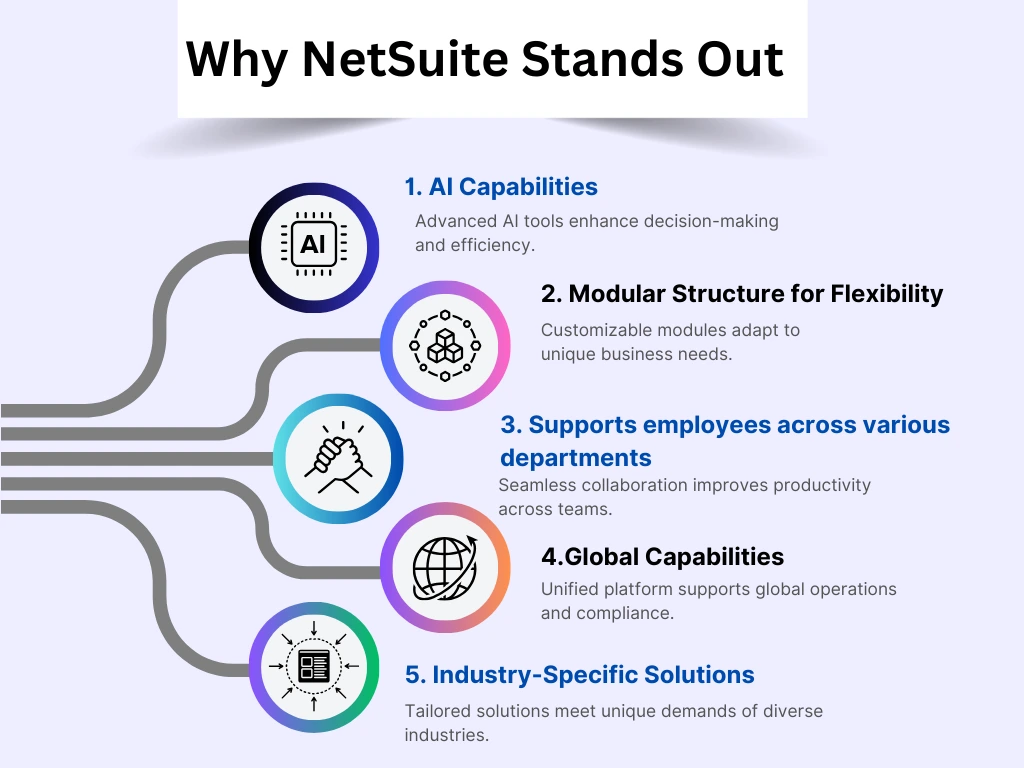Businesses today need scalable, integrated, and cloud-based solutions to manage their financials, inventory, supply chain, and customer relationships. NetSuite, a leading cloud ERP system developed by Oracle, provides an all-in-one business management platform designed for growing enterprises, mid-sized businesses, and large corporations.

NetSuite ERP enables businesses to:
- Automate financial and accounting processes
- Enhance inventory and supply chain management
- Improve customer relationship management (CRM)
- Gain real-time insights with business intelligence and analytics
In this guide, we’ll explore what NetSuite is, how it works, its key features, pricing, and who should use it.
What is NetSuite?
NetSuite is a cloud-based Enterprise Resource Planning (ERP) software that integrates finance, inventory, CRM, e-commerce, and human resources into a single system. Acquired by Oracle in 2016, NetSuite has become one of the most widely used ERP solutions globally.
Unlike traditional ERP software, NetSuite is entirely cloud-based, eliminating the need for on-premise installations and maintenance.
Key Benefits of NetSuite ERP
- Real-time data access from anywhere
- Automated business processes to improve efficiency
- Scalable for businesses of all sizes
- Seamless integration with third-party applications
- Customizable dashboards and reporting
NetSuite is used by companies across various industries, including retail, wholesale distribution, manufacturing, services, and e-commerce.
Key Features of NetSuite ERP
1. Financial Management & Accounting
- Automated billing, revenue recognition, and tax management
- Multi-currency and multi-subsidiary financial consolidation
- Comprehensive financial reporting and compliance tracking
2. Inventory & Supply Chain Management
- Real-time inventory tracking across multiple locations
- Warehouse and order management automation
- Forecasting and demand planning tools
3. Customer Relationship Management (CRM)
- 360-degree customer view across sales, marketing, and support
- Lead tracking, sales automation, and customer communication tools
- Integration with e-commerce and customer support platforms
4. E-Commerce Integration
- Unified platform for online and in-store sales
- Real-time synchronization with inventory and financials
- Multi-channel selling and order processing
5. HR & Payroll Management
- Employee self-service portals
- Payroll automation and compliance tracking
- Performance management and workforce analytics
6. Business Intelligence & Reporting
- Customizable dashboards with real-time data visualization
- Advanced analytics for financial, sales, and operational insights
- AI-driven forecasting and decision-making tools
NetSuite Pricing – How Much Does It Cost?
NetSuite pricing varies based on company size, modules required, and number of users. Oracle does not provide public pricing, but estimates suggest:
| Plan | Best For | Estimated Pricing |
|---|---|---|
| NetSuite Starter Edition | Small businesses and startups | Starts at $999/month + per-user fees |
| NetSuite Standard Edition | Mid-sized businesses with moderate operations | Custom pricing |
| NetSuite Enterprise Edition | Large enterprises with multiple subsidiaries | Custom pricing |
To get exact pricing, businesses need to request a custom quote from Oracle.
Request a NetSuite Pricing Quote
Who Should Use NetSuite?
NetSuite is ideal for businesses that:
✔ Need a scalable cloud ERP with global capabilities
✔ Require multi-entity and multi-currency management
✔ Want to automate financials, inventory, and customer management
✔ Operate in industries like wholesale distribution, manufacturing, e-commerce, and professional services
Industries That Benefit Most from NetSuite
| Industry | Key Benefits |
|---|---|
| Retail & E-Commerce | Unified inventory and order management across channels |
| Wholesale Distribution | Real-time supply chain tracking and automation |
| Manufacturing | Production planning, BOM tracking, and warehouse management |
| Professional Services | Project-based accounting, time tracking, and client management |
| Software & SaaS | Subscription billing, revenue recognition, and customer support tools |
NetSuite vs. Competitors – How Does It Compare?
| ERP System | Best For | Pricing |
|---|---|---|
| NetSuite ERP | All-in-one cloud ERP for mid-sized to large businesses | Starts at $999/month |
| SAP Business One | Manufacturing & large enterprises | Custom pricing |
| Microsoft Dynamics 365 | Businesses using Microsoft ecosystem | Starts at $180/user/month |
| Odoo ERP | Open-source and budget-friendly ERP | Free – $25/user/month |
| QuickBooks Enterprise | Small business accounting | Starts at $140/month |
NetSuite is a more advanced and scalable ERP, while SAP, Microsoft Dynamics, and QuickBooks are better suited for specific business needs.
How to Implement NetSuite ERP Successfully
1. Assess Business Needs & ERP Goals
- Define what processes need improvement (finance, inventory, CRM, etc.).
- Identify current pain points and inefficiencies.
2. Choose the Right NetSuite Edition & Modules
- Starter Edition for small businesses
- Standard Edition for mid-sized operations
- Enterprise Edition for large corporations
3. Work with a NetSuite Implementation Partner
- Implementing ERP software can be complex.
- A NetSuite Solution Provider can help with configuration, customization, and training.
4. Train Employees & Optimize Workflows
- Ensure key users receive proper training.
- Automate repetitive processes to maximize efficiency.
Frequently Asked Questions (FAQ) About NetSuite ERP
1. Is NetSuite suitable for small businesses?
Yes, NetSuite offers a Starter Edition for small businesses, but the pricing may be higher than alternatives like QuickBooks or Odoo.
2. Does NetSuite integrate with other business applications?
Yes, NetSuite integrates with CRM, e-commerce, payroll, and third-party financial software like Salesforce, Shopify, and PayPal.
3. Is NetSuite better than QuickBooks?
NetSuite is more advanced than QuickBooks, offering full ERP capabilities, while QuickBooks is mainly focused on accounting.
4. What is the difference between NetSuite and SAP?
NetSuite is fully cloud-based, whereas SAP offers both cloud and on-premise solutions. SAP is better for large, complex enterprises, while NetSuite is more versatile for mid-sized businesses.
Conclusion – Is NetSuite the Right ERP for Your Business?
NetSuite is one of the most powerful cloud ERP solutions for businesses looking to:
- Automate and integrate financial, inventory, CRM, and HR processes
- Gain real-time insights into business operations
- Scale without infrastructure limitations
However, it is best suited for mid-sized to large businesses due to its pricing and advanced capabilities.